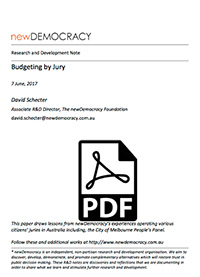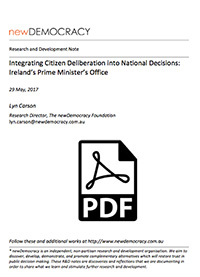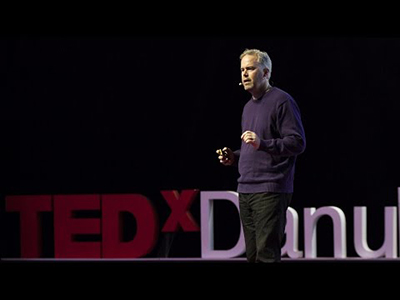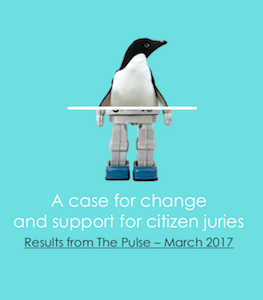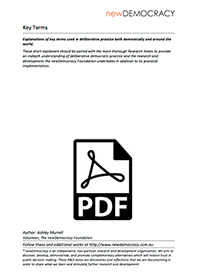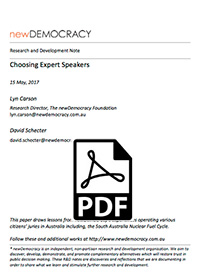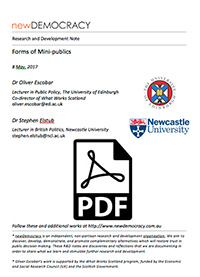David Schecter – Associate R&D Director, The newDemocracy Foundation What is the question? Budgeting is hard. Governments are faced with expanding demands for services and needs for infrastructure, combined with insufficient ability to raise revenue. Elected representatives face intense and conflicting pressures from interest groups. Public opinion, as evidenced through the media, is likely to be...Continue reading
newDemocracy Foundation R&D: May 2017 Research Newsletter
Welcome to our new research newsletter. The newDemocracy Foundation takes research seriously. We have funded independent research projects for many years (and reports from these projects can be found on our website), but have recently decided to take an even more proactive and direct approach. Our focus will now be to commission specific research, rather than...Continue reading
Integrating Citizen Deliberation into National Decisions: Ireland’s Prime Minister’s Office (Updated)
Lyn Carson – Research Director, The newDemocracy Foundation What is the question? How could a prime minister’s office build trust in order to make the most contentious national decisions, and does the recent experience in Ireland help to answer this? Why answer this question? There is increasing world-wide distrust in politicians and elections. Democracy was borne...Continue reading
Brett Hennig TEDx Talk
In his talk Brett Hennig presents a compelling, coherent case of fixing broken democracy by replacing elected politicans with ordinary people. Sounds crazy? You’ll be suprised to hear, it actually works.Dr Brett Hennig (taxi driver, software engineer, social justice activist, mathematics tutor, PhD in astrophysics) is a director and co-founder of the Sortition Foundation whose...Continue reading
Citizens’ Assembly abortion voting more nuanced than it first appeared
Justice Mary Laffoy and the Citizens’ Assembly have done the State some service in terms of determining future approaches in law on abortion – and their deliberations must be listened to and acted upon. The Assembly voted to repeal Article 40.3.3 and proposed that a new constitutional provision be inserted granting the Oireachtas exclusive power...
Coalition frantically selling the budget but voters stay switched off
There’s an asterisk on a lot of political analysis, a rider at the end of deliberations about the impact of this or that event: “So long as the voters haven’t stopped listening.” When Malcolm Turnbull pulled off a budget policy flip that would have made Nadia Comăneci proud, we all pondered whether he had outmanoeuvred...Continue reading
The Pulse: Australian Perspectives on Trust, The Political System and Citizens Juries
Pollinate Research, April 2017 In March 2017, Pollinate Research conducted a quantitative study that takes the ‘pulse’ of Australians on a range of issues and concerns. Pollinate is an independently owned and run research agency based in Sydney, and has conducted similar work on a regular basis since 2007. Each round of research samples 1,000 respondents nationwide, and...Continue reading
Planning Cells
What is the planning cell method? Planning cells are a form of deliberative democracy used as a decision making tool to develop a set of solutions to a problem delegated by a government body or organisation. The method encourages its participants to come to a neutral, fact-based conclusion that takes into consideration the views of...Continue reading
Choosing Expert Speakers
Lyn Carson – Research Director, The newDemocracy Foundation David Schecter – Associate R&D Director, The newDemocracy Foundation What is the question? The note “Hearing from Experts” makes the point that mini-publics need the help of experts in order to become adequately informed. To be successful in their purpose, these experts must not only be knowledgeable, but also representative...Continue reading
Forms of Mini-Publics: An introduction to deliberative innovations in democratic practice
Dr Oliver Escobar – Lecturer in Public Policy, The University of Edinburgh Co-director of What Works Scotland Dr Stephen Elstub – Lecturer in British Politics, Newcastle University Introduction This paper introduces a range of democratic innovations known as ‘mini-publics’ and outlines key features, how they work, and how they may improve opportunities for citizens to contribute to...Continue reading

